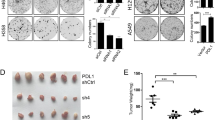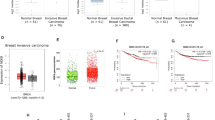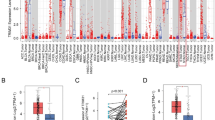Abstract
β-catenin accumulation is often found in lung tumors, but only a few patients have mutations in β-catenin gene. In addition, activated p53 downregulates β-catenin. Therefore, we postulated that alteration of the degradation complex AXIN2 (axis inhibition protein 2) and betaTrCP (β-transducin repeat-containing protein) and p53 regulation could result in β-catenin protein accumulation in lung cancer. Using the immunohistochemical and sequencing analyses, we found that patients with β-catenin accumulation without mutation were associated with patients with p53 overexpression and low AXIN2 expression (P=0.023∼0.041). Alteration of AXIN2 was associated with poor survival in early stage patients (P=0.016). Low expression of AXIN2 and betaTrCP was significantly associated with promoter hypermethylation and histone deacetylation. Ectopic expression and knockdown of p53, AXIN2 and betaTrCP genes in A549 (p53 wild-type) and H1299 (p53 null) lung cancer cell lines showed cooperation between p53 and AXIN2/betaTrCP in the reduction of β-catenin expression. Our clinical and cell model findings provide new evidence that epigenetic silencing of AXIN2/betaTrCP in the degradation complex and deregulation of p53-mediated control lead to wild-type β-catenin nuclear accumulation in non-small cell lung cancer tumorigenesis. In addition, a high level of p53 downregulates the β-catenin expression, but this effect is attenuated by non-functional AXIN2 or betaTrCP in lung cancer.
This is a preview of subscription content, access via your institution
Access options
Subscribe to this journal
Receive 50 print issues and online access
$259.00 per year
only $5.18 per issue
Buy this article
- Purchase on Springer Link
- Instant access to full article PDF
Prices may be subject to local taxes which are calculated during checkout





Similar content being viewed by others
Abbreviations
- NSCLC:
-
non-small cell lung cancer
- RT–PCR:
-
reverse transcriptase–PCR
- MSP:
-
methylation-specific PCR
- LOH:
-
loss of heterozygosity
- 5-aza-dC:
-
5-aza-2′-deoxycytidine
- SAHA:
-
suberoylanilide hydroxamic acid
References
Chen RH, Ding WV, McCormick F . (2000). Wnt signaling to beta-catenin involves two interactive components. Glycogen synthase kinase-3beta inhibition and activation of protein kinase C. J Biol Chem 275: 17894–17899.
Chu YW, Yang PC, Yang SC, Shyu YC, Hendrix MJ, Wu R et al. (1997). Selection of invasive and metastatic subpopulations from a human lung adenocarcinoma cell line. Am J Respir Cell Mol Biol 17: 353–360.
Chung GG, Zerkowski MP, Ocal IT, Dolled-Filhart M, Kang JY, Psyrri A et al. (2004). beta-Catenin and p53 analyses of a breast carcinoma tissue microarray. Cancer 100: 2084–2092.
Damalas A, Ben-Ze'ev A, Simcha I, Shtutman M, Leal JF, Zhurinsky J et al. (1999). Excess beta-catenin promotes accumulation of transcriptionally active p53. EMBO J 18: 3054–3063.
Derks S, Lentjes MH, Hellebrekers DM, de Bruine AP, Herman JG, van Engeland M . (2004). Methylation-specific PCR unraveled. Cell Oncol 26: 291–299.
Gregorieff A, Clevers H . (2005). Wnt signaling in the intestinal epithelium: from endoderm to cancer. Genes Dev 19: 877–890.
Hughes TA, Brady HJ . (2005). Cross-talk between pRb/E2F and Wnt/beta-catenin pathways: E2F1 induces axin2 leading to repression of Wnt signalling and to increased cell death. Exp Cell Res 303: 32–46.
Hughes TA, Brady HJ . (2006). Regulation of axin2 expression at the levels of transcription, translation and protein stability in lung and colon cancer. Cancer Lett 233: 338–347.
Jones PA, Baylin SB . (2007). The epigenomics of cancer. Cell 128: 683–692.
Kase S, Sugio K, Yamazaki K, Okamoto T, Yano T, Sugimachi K . (2000). Expression of E-cadherin and beta-catenin in human non-small cell lung cancer and the clinical significance. Clin Cancer Res 6: 4789–4796.
Kim CJ, Song JH, Cho YG, Kim YS, Kim SY, Nam SW et al. (2007). Somatic mutations of the beta-TrCP gene in gastric cancer. APMIS 115: 127–133.
Kinzler KW, Vogelstein B . (1996). Lessons from hereditary colorectal cancer. Cell 87: 159–170.
Koch A, Waha A, Hartmann W, Hrychyk A, Schuller U, Wharton KA et al. (2005). Elevated expression of Wnt antagonists is a common event in hepatoblastomas. Clin Cancer Res 11: 4295–4304.
Koinuma K, Yamashita Y, Liu W, Hatanaka H, Kurashina K, Wada T et al. (2006). Epigenetic silencing of AXIN2 in colorectal carcinoma with microsatellite instability. Oncogene 25: 139–146.
Lee MN, Tseng RC, Hsu HS, Chen JY, Tzao C, Ho WL et al. (2007). Epigenetic inactivation of the chromosomal stability control genes BRCA1, BRCA2, and XRCC5 in non-small cell lung cancer. Clin Cancer Res 13: 832–838.
Levina E, Oren M, Ben-Ze'ev A . (2004). Downregulation of beta-catenin by p53 involves changes in the rate of beta-catenin phosphorylation and Axin dynamics. Oncogene 23: 4444–4453.
Liu J, Stevens J, Rote CA, Yost HJ, Hu Y, Neufeld KL et al. (2001). Siah-1 mediates a novel beta-catenin degradation pathway linking p53 to the adenomatous polyposis coli protein. Mol Cell 7: 927–936.
Liu W, Dong X, Mai M, Seelan RS, Taniguchi K, Krishnadath KK et al. (2000). Mutations in AXIN2 cause colorectal cancer with defective mismatch repair by activating beta-catenin/TCF signalling. Nat Genet 26: 146–147.
Lustig B, Jerchow B, Sachs M, Weiler S, Pietsch T, Karsten U et al. (2002). Negative feedback loop of Wnt signaling through upregulation of conductin/axin2 in colorectal and liver tumors. Mol Cell Biol 22: 1184–1193.
Mazieres J, He B, You L, Xu Z, Jablons DM . (2005). Wnt signaling in lung cancer. Cancer Lett 222: 1–10.
Minna JD, Roth JA, Gazdar AF . (2002). Focus on lung cancer. Cancer Cell 1: 49–52.
Moon RT, Kohn AD, De Ferrari GV, Kaykas A . (2004). WNT and beta-catenin signalling: diseases and therapies. Nat Rev Genet 5: 691–701.
Morin PJ, Sparks AB, Korinek V, Barker N, Clevers H, Vogelstein B et al. (1997). Activation of beta-catenin-Tcf signaling in colon cancer by mutations in beta-catenin or APC. Science 275: 1787–1790.
Polakis P . (2000). Wnt signaling and cancer. Genes Dev 14: 1837–1851.
Sadot E, Geiger B, Oren M, Ben-Ze'ev A . (2001). Down-regulation of beta-catenin by activated p53. Mol Cell Biol 21: 6768–6781.
Shigemitsu K, Sekido Y, Usami N, Mori S, Sato M, Horio Y et al. (2001). Genetic alteration of the beta-catenin gene (CTNNB1) in human lung cancer and malignant mesothelioma and identification of a new 3p21.3 homozygous deletion. Oncogene 20: 4249–4257.
Spiegelman VS, Slaga TJ, Pagano M, Minamoto T, Ronai Z, Fuchs SY . (2000). Wnt/beta-catenin signaling induces the expression and activity of betaTrCP ubiquitin ligase receptor. Mol Cell 5: 877–882.
Taketo MM . (2004). Shutting down Wnt signal-activated cancer. Nat Genet 36: 320–322.
Tseng RC, Chang JW, Hsien FJ, Chang YH, Hsiao CF, Chen JT et al. (2005). Genomewide loss of heterozygosity and its clinical associations in non small cell lung cancer. Int J Cancer 117: 241–247.
Wang YC, Lin RK, Tan YH, Chen JT, Chen CY . (2005). Wild-type p53 overexpression and its correlation with MDM2 and p14ARF alterations: an alternative pathway to non-small-cell lung cancer. J Clin Oncol 23: 154–164.
Wodarz A, Nusse R . (1998). Mechanisms of Wnt signaling in development. Annu Rev Cell Dev Biol 14: 59–88.
Acknowledgements
This research was funded in part by Grants NSC95-2320-B-006-087-MY3 and DOH97-TD-G-111-004 from the National Science Council (The Executive Yuan, ROC).
Author information
Authors and Affiliations
Corresponding author
Additional information
Originality: Our data provide new evidences for β-catenin accumulation through inactivation of AXIN2/betaTrCP-mediated stability control and blockage of p53-promoted β-catenin degradation in lung cancer. This is also the first study to show that AXIN2 and betaTrCP augment the p53 downregulation of β-catenin expression. Promoter hypermethylation and histone deacetylation are the predominant mechanisms of AXIN2 and betaTrCP inactivation in lung cancer.
Supplementary Information accompanies the paper on the Oncogene website (http://www.nature.com/onc)
Rights and permissions
About this article
Cite this article
Tseng, RC., Lin, RK., Wen, CK. et al. Epigenetic silencing of AXIN2/betaTrCP and deregulation of p53-mediated control lead to wild-type β-catenin nuclear accumulation in lung tumorigenesis. Oncogene 27, 4488–4496 (2008). https://doi.org/10.1038/onc.2008.83
Received:
Revised:
Accepted:
Published:
Issue Date:
DOI: https://doi.org/10.1038/onc.2008.83
Keywords
This article is cited by
-
A leukemia-protective germline variant mediates chromatin module formation via transcription factor nucleation
Nature Communications (2022)
-
MicroRNA-137 reduces stemness features of pancreatic cancer cells by targeting KLF12
Journal of Experimental & Clinical Cancer Research (2019)
-
An immunohistochemical approach to detect oncogenic CTNNB1 mutations in primary neoplastic tissues
Laboratory Investigation (2019)
-
MiR-214 Regulates the Human Hair Follicle Stem Cell Proliferation and Differentiation by Targeting EZH2 and Wnt/β-Catenin Signaling Way In Vitro
Tissue Engineering and Regenerative Medicine (2018)
-
Association of Wnt signaling pathway genetic variants in gallbladder cancer susceptibility and survival
Tumor Biology (2016)



